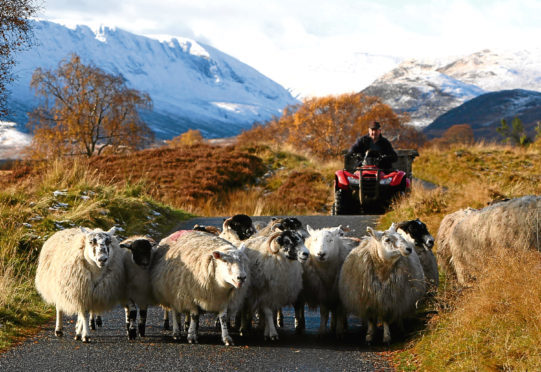The long-term viability of beef and sheep farms is questionable in a post-Brexit era, warns farm consultancy firm Andersons.
The company’s senior agricultural economist made the comments during a seminar at Perth Racecourse on the future prospects for UK agriculture.
He said although returns from mixed beef and sheep units may continue to be adequate for the next couple of years, the long-term viability of these enterprises was very much dependent on what future agricultural policy and trade deals look like once the UK leaves Europe.
“Much will depend on the level and type of farm support provided by the Scottish Government,” said Mr Haverty.
Giving an overview of the Andersons model lowland beef and sheep farm – Meadow Farm – Mr Haverty provided an indication of how the firm believes mixed livestock units will perform in the next couple of years.
The fictitious 380-acre farm carries a 60-cow suckler herd, with all progeny finished, a dairy bull beef enterprise and a 500-ewe breeding flock.
For the 2016/17 year, the margin from production was a loss of £140 per hectare (/ha), which when subsidy support of £245/ha is applied, results in a business surplus of £105/ha being achieved.
Mr Haverty said: “The current financial year ended March 2018 is forecast to show an improved business surplus as a result of better livestock prices. Nevertheless, the business is still heavily reliant on support payments, which, due to the weakening of the Pound, have seen a significant rise over the last couple of years.”
The model predicts a margin of production of -£108/ha and a business surplus of £182/ha for the current financial year.
This is followed by a margin of -£147/ha and a business surplus of £121/ha in 2018/19.
Commenting on the beef and sheep market, Mr Haverty said the amount of home-produced lamb consumed in the UK had fallen by more than 25% in the past 10 years.
“The sheepmeat sector is heavily reliant on exports to the EU, which account for the vast majority – over 96% – of total exports,” he added.
“An agreement on transition between the UK and the EU will be pivotal in safeguarding the beef and sheep meat markets to 2020.
“It is becoming more apparent that the sector needs a long-term strategy to reduce exposure to the EU and tap into the fast-growing markets in the Middle East and Asia.
“Even before Brexit takes place, there is a lot that the UK Government could be doing in terms of securing market access through equivalence agreements.”
